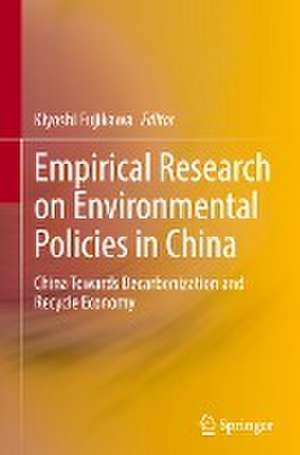Empirical Research on Environmental Policies in China: China Towards Decarbonization and Recycle Economy
Editat de Kiyoshi Fujikawaen Limba Engleză Hardback – 9 ian 2024
The book also contains an analysis of the environmental and economic impacts of changes in resource circulation in East Asia. Although motorization is advancing rapidly, the vein industry for recycling used cars has not progressed. The authors estimate the amount of materials from used cars including new energy vehicles (electric and fuel cell vehicles) and propose desirable policies for used vehicles. East Asia is interdependent with respect to carbon and waste as well as the economy. China has regulated the import of waste recently and has started recycling its own wastes, putting pressure on neigboring countries to recycle their waste domestically. The authors estimate the environmental and economic impacts of such policy changes.
Preț: 781.94 lei
Preț vechi: 953.58 lei
-18% Nou
Puncte Express: 1173
Preț estimativ în valută:
149.62€ • 156.64$ • 123.80£
149.62€ • 156.64$ • 123.80£
Carte tipărită la comandă
Livrare economică 05-19 aprilie
Preluare comenzi: 021 569.72.76
Specificații
ISBN-13: 9789819959563
ISBN-10: 981995956X
Pagini: 173
Ilustrații: XIII, 173 p. 1 illus.
Dimensiuni: 155 x 235 mm
Greutate: 0.44 kg
Ediția:1st ed. 2023
Editura: Springer Nature Singapore
Colecția Springer
Locul publicării:Singapore, Singapore
ISBN-10: 981995956X
Pagini: 173
Ilustrații: XIII, 173 p. 1 illus.
Dimensiuni: 155 x 235 mm
Greutate: 0.44 kg
Ediția:1st ed. 2023
Editura: Springer Nature Singapore
Colecția Springer
Locul publicării:Singapore, Singapore
Cuprins
Chapter 1. Climate policies in China: Renewable energy introduction and National Emissions Trading Scheme.- Chapter 2. Introduction of Extended Producer Responsibility in China.- Chapter 3. Plastic Recycling Policy in China and the Waste Plastic Trade.- Chapter 4. Change of Industrial structure and CO2 emissions in China.- Chapter 5. Productivity and Eenergy Efficiency of Chinese Industries.- Chapter 6. Optimal location for large-scale wind farms in China.- Chapter 7. Initial allocation of emissions trading among sub-regions in China.- Chapter 8. Recycling Resources from End-of-Life Vehicles.- Chapter 9. Carbon Leakage in Carbon Taxes and Emissions Trading Scheme Taking China as an Example.- Chapter 10. Environmental Benefits of Plastic Waste Recycling: Preparation and Application of Waste Input–Output Table in China.
Notă biografică
Kiyoshi Fujikawa is currently a professor of economics at Aichi Gakuin University, Nagoya, Japan. He has over 30 years of research experience in the field\s of environmental economics, development economics, international economics, and more in Nagoya University and Konan University. He got his PhD in economics at Kobe University in 2000. Besides those universities, he also has served as a visiting researcher at the Economic and Social Research Institute (ESRI) of the Cabinet Office, the Institute of Population and Social Security Research (IPSS), and the Study Group on Economic Evaluation of Culture and Arts in the Agency for Cultural Affairs. He has served as President of the Pan-Pacific Association of Input-Output Studies (PAPAIOS), and as a board member of the Society of Environmental Economic Policy Studies (SEEPS). Outside academia, he has worked for a Statistician in the Department of Economic and Social Affairs (DESA) in the United Nations.
Textul de pe ultima copertă
This book presents an empirical study of the effects of environmental policies on China and its neighboring countries, with a focus on waste and climate policies in China. The two major carbon policies have to do with carbon markets and renewable energy. The authors first examine the effectiveness of the Asian carbon market. Because of the consumption of goods beyond provincial borders, nationwide carbon markets are rather difficult to operate; therefore, a desirable initial allocation in the carbon market is proposed in this book. As for renewable power, its sources have not been fully utilized owing to a regional mismatch of supply and demand, so optimal locations of renewable energy are shown.
The book also contains an analysis of the environmental and economic impacts of changes in resource circulation in East Asia. Although motorization is advancing rapidly, the vein industry for recycling used cars has not progressed. The authors estimate the amount of materials from used cars including new energy vehicles (electric and fuel cell vehicles) and propose desirable policies for used vehicles. East Asia is interdependent with respect to carbon and waste as well as the economy. China has regulated the import of waste recently and has started recycling its own wastes, putting pressure on neighboring countries to recycle their waste domestically. The authors estimate the environmental and economic impacts of such policy changes.
Caracteristici
Focuses on climate change and waste management, pressing environmental issues in China Analyzes environmental and economic effects of policies in addition to analyzing the policies themselves Uses empirical analysis methods that are applicable to other countries and regions
